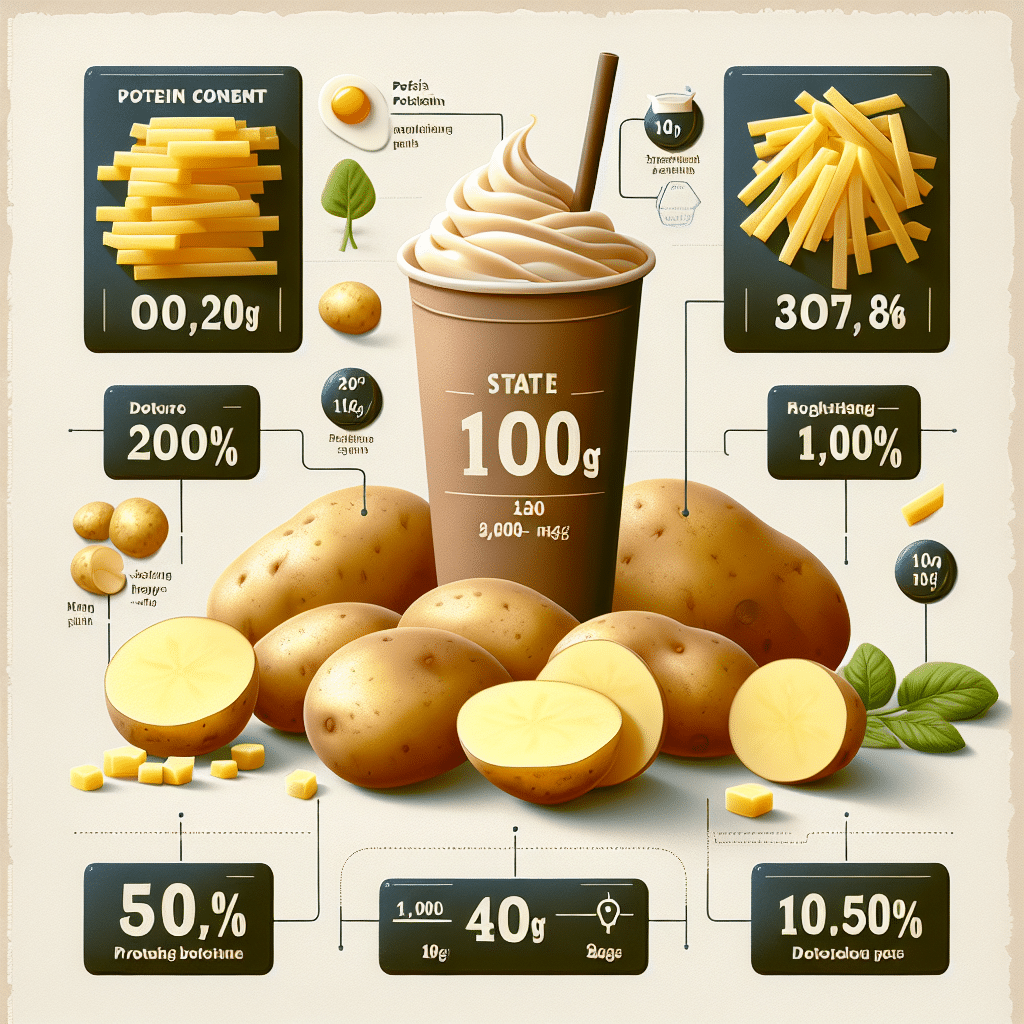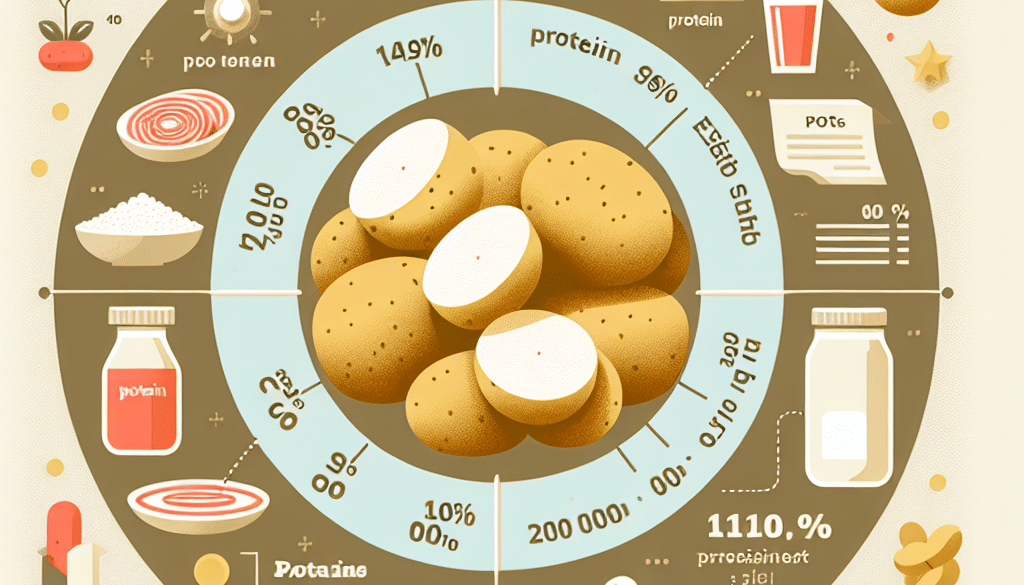How Much Protein Is In 100G Of Potatoes?
-
Table of Contents
- Protein Content in 100g of Potatoes: A Nutritional Insight
- Understanding Protein in Potatoes
- Protein Content in 100g of Potatoes
- Nutritional Benefits of Potatoes
- Role of Protein in a Healthy Diet
- Combining Potatoes with Other Protein Sources
- Conclusion: Potatoes as Part of a Protein-Rich Diet
- Explore ETprotein’s High-Quality Protein Products
Protein Content in 100g of Potatoes: A Nutritional Insight

Potatoes are a staple food in many cultures around the world, known for their versatility and nutritional benefits. While often recognized for their carbohydrate content, potatoes also contain proteins, vitamins, and minerals that contribute to a balanced diet. In this article, we will explore the protein content in 100g of potatoes and discuss the importance of protein in our diets.
Understanding Protein in Potatoes
Proteins are essential macronutrients required for the building, maintenance, and repair of tissues in the body. They are made up of amino acids, some of which are termed ‘essential’ because the body cannot synthesize them and they must be obtained from the diet.
Potatoes, primarily known for their carbohydrate content, also provide a modest amount of protein. The protein in potatoes is considered to be of high biological value, as it contains a good balance of amino acids, including lysine, which is often limited in grains.
Protein Content in 100g of Potatoes
The exact protein content in potatoes can vary depending on the potato variety and preparation method. On average, 100g of raw potatoes contain approximately 2 grams of protein. However, this amount can change when potatoes are cooked, as the water content is reduced and nutrients become more concentrated.
- Raw potatoes: Approximately 2g of protein per 100g
- Boiled potatoes: Slightly higher protein content due to water loss
- Baked potatoes: Similar to boiled, with some nutrient density increase
It’s important to note that while potatoes contribute to the overall protein intake, they should not be relied upon as the primary protein source in a diet. Combining potatoes with other protein-rich foods can ensure a more balanced intake of essential amino acids.
Nutritional Benefits of Potatoes
Beyond protein, potatoes are rich in other nutrients that play vital roles in maintaining good health:
- Vitamin C: Potatoes are a good source of vitamin C, which is important for immune function, skin health, and iron absorption.
- Potassium: They are high in potassium, which is crucial for maintaining normal blood pressure and heart function.
- Fiber: Potatoes contain dietary fiber, especially in the skin, which aids in digestion and can help prevent constipation.
- B vitamins: They provide various B vitamins, including B6, which is important for energy metabolism and nervous system health.
When consumed as part of a balanced diet, potatoes can contribute to overall nutritional well-being.
Role of Protein in a Healthy Diet
Protein is a key component of a healthy diet. It is not only essential for muscle growth and repair but also plays a role in various bodily functions:
- Enzyme production: Proteins are necessary for the creation of enzymes that facilitate countless biochemical reactions in the body.
- Hormone regulation: Many hormones, which act as chemical messengers, are proteins in nature.
- Immune response: Antibodies, which help fight infections, are made of protein.
- Transport and storage: Proteins transport substances throughout the body and store certain nutrients.
Ensuring adequate protein intake is crucial for overall health and well-being.
Combining Potatoes with Other Protein Sources
To maximize the nutritional benefits of potatoes and meet daily protein requirements, it is beneficial to combine them with other protein-rich foods:
- Animal proteins: Pairing potatoes with lean meats, poultry, fish, or dairy can provide a complete protein profile.
- Plant proteins: For a vegetarian or vegan option, combine potatoes with beans, lentils, or whole grains to ensure all essential amino acids are consumed.
This approach to eating not only enhances the protein content of meals but also adds variety and flavor.
Conclusion: Potatoes as Part of a Protein-Rich Diet
In conclusion, while potatoes are not a high-protein food, they do contribute to the protein content of a meal, especially when combined with other protein sources. With approximately 2 grams of protein per 100g, potatoes offer more than just carbohydrates to the diet. They are a valuable source of vitamins, minerals, and fiber, which are all essential for maintaining good health.
Understanding the role of potatoes in a balanced diet can help individuals make informed choices about their protein intake and overall nutrition. By incorporating a variety of protein sources alongside potatoes, one can enjoy the full spectrum of nutritional benefits these versatile tubers have to offer.
Explore ETprotein’s High-Quality Protein Products
If you’re looking to supplement your diet with additional protein, consider exploring ETprotein’s range of organic bulk vegan proteins. ETprotein offers a variety of plant-based protein options that can complement any diet, including those that feature potatoes as a staple.
With products like Organic rice protein, pea protein, and pumpkin seed protein, ETprotein caters to diverse dietary needs and preferences. Their non-GMO, allergen-free proteins with high purity levels are perfect for enhancing your meals and ensuring you meet your daily protein requirements.
For more information on ETprotein’s offerings and how they can fit into your healthy, balanced diet, please contact sales(at)ETprotein.com.
About ETprotein:
ETprotein, a reputable protein and L-(+)-Ergothioneine (EGT) Chinese factory manufacturer and supplier, is renowned for producing, stocking, exporting, and delivering the highest quality organic bulk vegan proteins and L-(+)-Ergothioneine. They include Organic rice protein, clear rice protein, pea protein, clear pea protein, watermelon seed protein, pumpkin seed protein, sunflower seed protein, mung bean protein, peanut protein, and L-(+)-Ergothioneine EGT Pharmaceutical grade, L-(+)-Ergothioneine EGT food grade, L-(+)-Ergothioneine EGT cosmetic grade, L-(+)-Ergothioneine EGT reference grade and L-(+)-Ergothioneine EGT standard. Their offerings, characterized by a neutral taste, non-GMO, allergen-free attributes, with L-(+)-Ergothioneine purity over 98%, 99%, cater to a diverse range of industries. They serve nutraceutical, pharmaceutical, cosmeceutical, veterinary, as well as food and beverage finished product distributors, traders, and manufacturers across Europe, USA, Canada, Australia, Thailand, Japan, Korea, Brazil, and Chile, among others.
ETprotein specialization includes exporting and delivering tailor-made protein powder and finished nutritional supplements. Their extensive product range covers sectors like Food and Beverage, Sports Nutrition, Weight Management, Dietary Supplements, Health and Wellness Products, and Infant Formula, ensuring comprehensive solutions to meet all your protein needs.
As a trusted company by leading global food and beverage brands and Fortune 500 companies, ETprotein reinforces China’s reputation in the global arena. For more information or to sample their products, please contact them and email sales(at)ETprotein.com today.














